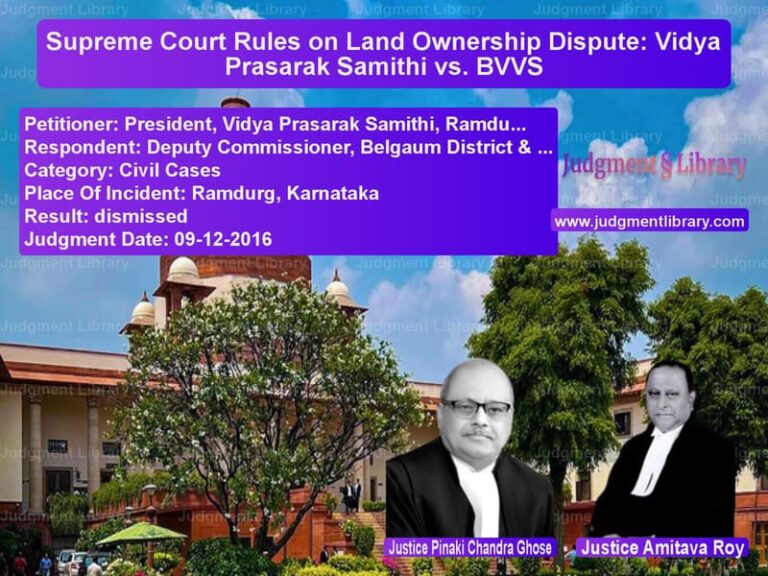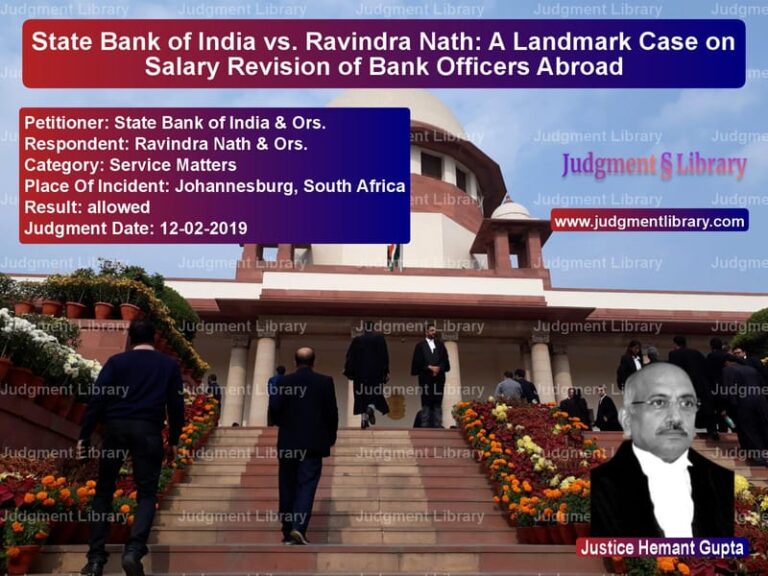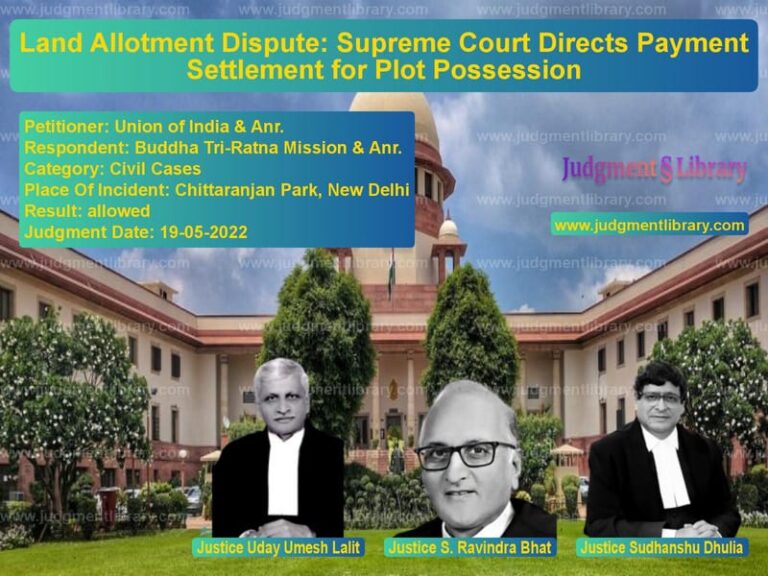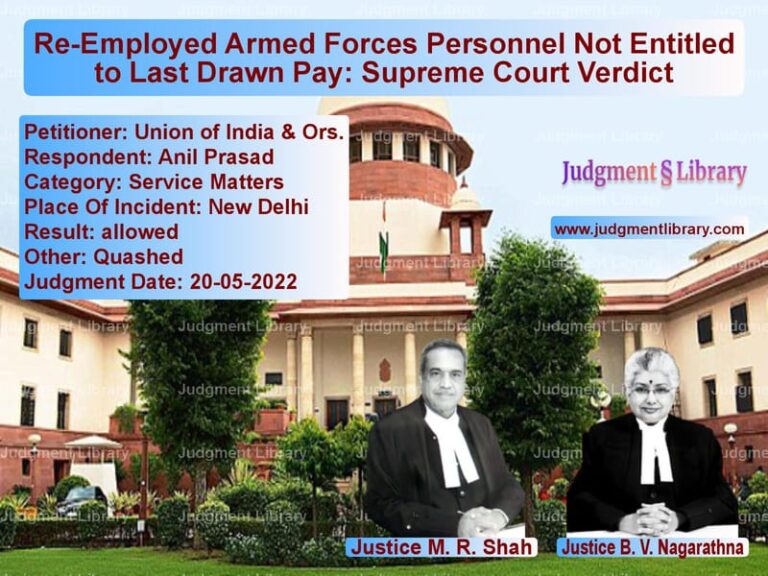Supreme Court Strikes Down Bihar Government’s Notification Granting Scheduled Tribe Status to Lohar Community
The Supreme Court of India, in a landmark ruling in the case of Sunil Kumar Rai & Ors. vs. The State of Bihar & Ors., struck down the Bihar Government’s 2016 notification that granted Scheduled Tribe (ST) status to the Lohar community. The judgment reaffirmed that the power to recognize Scheduled Tribes lies solely with the President under Article 342 of the Constitution, and any unilateral action by a state government is unconstitutional.
Background of the Case
The petitioners filed a writ petition under Article 32 of the Constitution, challenging the Bihar Government’s notification dated 23.08.2016, which granted ST status to the Lohar community. The petitioners argued that this notification violated constitutional provisions and past judicial precedents.
Key developments:
- The Bihar Government issued a notification allowing the Lohar community to receive Scheduled Tribe certificates and other ST benefits.
- The petitioners argued that the Lohar community was historically classified as an Other Backward Class (OBC) in Bihar and was never part of the Scheduled Tribe list.
- The petitioners further contended that based on this illegal notification, false cases were filed against them under the Scheduled Castes and Scheduled Tribes (Prevention of Atrocities) Act, 1989.
- The notification relied on a repealed Act (Act 48 of 2006), which had amended the Scheduled Tribes list but was subsequently nullified by Act 23 of 2016.
- The Supreme Court examined past judgments, which repeatedly clarified that Lohars were not Scheduled Tribes but belonged to the OBC category.
Petitioners’ Arguments
- The petitioners contended that the Bihar Government’s notification was unconstitutional as only the President, in consultation with Parliament, has the power to include or exclude any community from the Scheduled Tribes list under Article 342.
- They highlighted that the notification led to widespread misuse of the SC/ST Act, as numerous false cases were filed against innocent individuals.
- The petitioners cited previous Supreme Court rulings, including Nityanand Sharma vs. State of Bihar (1996), which had unequivocally held that Lohars were not Scheduled Tribes.
- They also argued that the notification violated Article 14 (Right to Equality) as it arbitrarily granted benefits to an ineligible community, thereby depriving genuine Scheduled Tribe members of their rightful benefits.
Respondent’s Arguments (State of Bihar)
- The Bihar Government argued that the notification was based on extensive ethnographic studies that concluded that Lohars and Loharas were the same community.
- They claimed that after the 2016 repeal of the Act 48 of 2006, the position of the 1976 Scheduled Tribes order was restored, allowing them to grant ST certificates to Lohars.
- The State contended that the petitioners had delayed their challenge to the notification, raising concerns only after five years.
- They also asserted that the issue involved individual grievances related to criminal cases and should be addressed at the High Court level, rather than directly invoking Article 32 before the Supreme Court.
Supreme Court’s Judgment
The Supreme Court ruled in favor of the petitioners, quashing the Bihar Government’s 2016 notification. The Court reaffirmed that the power to recognize Scheduled Tribes is exclusively vested in the President and Parliament, and any attempt by a state government to alter the list is unconstitutional.
Key Observations:
- The Court noted that the notification was issued in complete disregard of its past rulings, particularly Nityanand Sharma vs. State of Bihar (1996) and Prabhat Kumar Sharma vs. Union Public Service Commission (2006), which had settled that Lohars were not Scheduled Tribes.
- It held that state governments do not have the authority to unilaterally alter the Scheduled Tribes list.
- The Court emphasized that the notification violated Article 14, as it conferred ST benefits on a community that was historically classified as OBC.
- It found that the notification led to misuse of the SC/ST Act, with false cases being filed against innocent individuals.
- The judgment clarified that the repeal of the 2006 Act did not alter the fact that Lohars were not Scheduled Tribes.
Key Excerpts from the Supreme Court Judgment
On the exclusivity of the President’s power under Article 342:
“The Constitution unambiguously vests the power to recognize Scheduled Tribes with the President and Parliament. Any attempt by a state government to alter this classification is unconstitutional and void ab initio.”
On the illegality of the Bihar Government’s notification:
“The impugned notification is in blatant disregard of settled judicial precedents and constitutional provisions. It seeks to grant benefits to a community that has never been recognized as Scheduled Tribe.”
On the misuse of the SC/ST Act:
“The notification has led to the unwarranted persecution of innocent individuals under the SC/ST Act. This is a matter of grave concern that cannot be overlooked.”
Final Verdict
The Supreme Court issued the following directions:
- The Bihar Government’s 2016 notification granting ST status to Lohars was quashed with immediate effect.
- The Bihar Government was directed to issue a fresh notification clarifying that Lohars remain classified as OBC and are not entitled to Scheduled Tribe benefits.
- The Supreme Court ordered the Bihar Government to pay ₹5,00,000 as compensation to the petitioners for the violation of their fundamental rights.
- The authorities were directed to take corrective action in cases where false SC/ST Act cases were filed based on the illegal notification.
Conclusion: Implications of the Judgment
This ruling has significant implications for governance, constitutional law, and social justice:
- It reaffirms that only the President and Parliament can determine the classification of Scheduled Tribes under Article 342.
- The judgment prevents arbitrary and politically motivated changes to reservation policies.
- It protects genuine Scheduled Tribe communities from dilution of their rights by ensuring that ineligible communities are not granted ST benefits.
- The ruling highlights the dangers of state governments bypassing constitutional provisions and making unilateral decisions that lead to legal chaos.
- It serves as a deterrent against the misuse of reservation policies for electoral gains.
By quashing the Bihar Government’s 2016 notification, the Supreme Court has reinforced constitutional principles, protected the rights of genuine ST communities, and prevented the misuse of reservation benefits by ineligible groups.
Petitioner Name: Sunil Kumar Rai & Ors..Respondent Name: The State of Bihar & Ors..Judgment By: Justice K. M. Joseph, Justice Hrishikesh Roy.Place Of Incident: Bihar.Judgment Date: 21-02-2022.
Don’t miss out on the full details! Download the complete judgment in PDF format below and gain valuable insights instantly!
Download Judgment: sunil-kumar-rai-&-or-vs-the-state-of-bihar-&-supreme-court-of-india-judgment-dated-21-02-2022.pdf
Directly Download Judgment: Directly download this Judgment
See all petitions in Fundamental Rights
See all petitions in Constitution Interpretation
See all petitions in Legislative Powers
See all petitions in Public Interest Litigation
See all petitions in Separation of Powers
See all petitions in Judgment by K.M. Joseph
See all petitions in Judgment by Hrishikesh Roy
See all petitions in allowed
See all petitions in supreme court of India judgments February 2022
See all petitions in 2022 judgments
See all posts in Constitutional Cases Category
See all allowed petitions in Constitutional Cases Category
See all Dismissed petitions in Constitutional Cases Category
See all partially allowed petitions in Constitutional Cases Category







